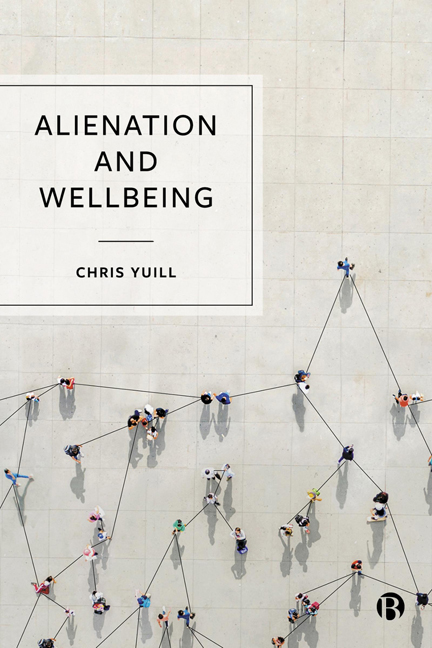Book contents
- Frontmatter
- Dedication
- Contents
- Acknowledgements
- Preface
- 1 What Is Alienation?
- 2 Responding to Criticisms of Alienation Theory
- 3 Alienation and Wellbeing
- 4 Case Study: Social Workers, the Compassionate Self and Disappointed Jugglers
- 5 Is Alienation Theory Still Relevant?
- 6 Beyond Alienation?
- References
- Index
3 - Alienation and Wellbeing
Published online by Cambridge University Press: 27 March 2024
- Frontmatter
- Dedication
- Contents
- Acknowledgements
- Preface
- 1 What Is Alienation?
- 2 Responding to Criticisms of Alienation Theory
- 3 Alienation and Wellbeing
- 4 Case Study: Social Workers, the Compassionate Self and Disappointed Jugglers
- 5 Is Alienation Theory Still Relevant?
- 6 Beyond Alienation?
- References
- Index
Summary
Introduction
Engels provided one of the strongest and most famous indictments in the Marxist canon of capitalism and the suffering it causes with his accusation against the bourgeoise that they commit ‘social murder’:
When one individual inflicts bodily injury upon another such that death results, we call the deed manslaughter; when the assailant knew in advance that the injury would be fatal, we call his deed murder. But when society places hundreds of proletarians in such a position that they inevitably meet a too early and an unnatural death, one which is quite as much a death by violence as that by the sword or bullet; when it deprives thousands of the necessaries of life, places them under conditions in which they cannot live – forces them, through the strong arm of the law, to remain in such conditions until that death ensues which is the inevitable consequence – knows that these thousands of victims must perish, and yet permits these conditions to remain, its deed is murder just as surely as the deed of the single individual; disguised, malicious murder, murder against which none can defend himself, which does not seem what it is, because no man sees the murderer, because the death of the victim seems a natural one, since the offence is more one of omission than of commission. But murder it remains.
(Engels 1993: 106)Engels is drawing attention to how the avoidable deaths of tens of thousands of people are made invisible by what McGarvey (2023) would today call the social distance between the murdered and the murderer. The assailant in a social murder is always absent from the scene of the crime. The relations of capital, between worker and bourgeoisie, leave no fingerprints, nor samples of DNA that can identify a perpetrator. The insightfulness of Engels lies in his assertion that the harm capitalism creates is assumed to be, as he says, natural, with the implication that no individual nor social class of people bear any responsibility. Poor health and wellbeing are waived away as plain bad luck, or, within the responsibilization discourses of neoliberalism, poor wellbeing is the result of an individual making bad choices about their health and wellbeing – perhaps deciding to smoke too much or indulging in too many high-fat foods.
- Type
- Chapter
- Information
- Alienation and Wellbeing , pp. 64 - 85Publisher: Bristol University PressPrint publication year: 2023

